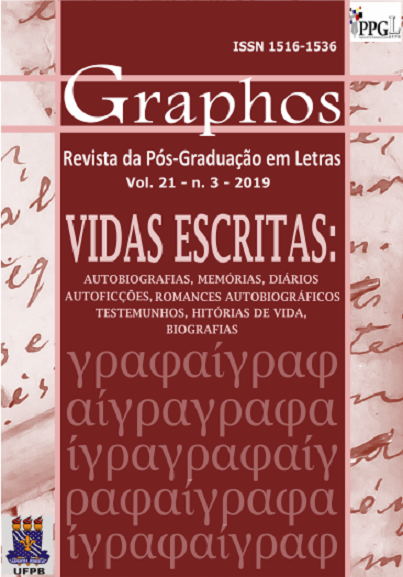Between realism and testimony: Crônicas da vida operária, by Roniwalter Jatobá
Keywords:
Realism, Testimony, Experience, Work, Roniwalter JatobáAbstract
This paper discusses the concepts of testimony, developed by Giorgio Agamben, and realism, by Federico Bertoni. These concepts are applied to Crônicas da vida operária, by Roniwalter Jatobá, on which literary critics and the author himself make considerations from his testimonial tone. Such considerations are taken as the object of analysis, and questions about the effects of reality are raised, revealing that the testimonial literature is a connection of universes. Thus, there is an intersection between the real and the fictional, which can be key to critical thinking about the universe of work.
Downloads
References
AGAMBEN, Giorgio. O que resta de Auschwitz: o arquivo e o testemunho (Homo Sacer III). São Paulo: Boitempo Editorial, 2008.
BENVENISTE, Émile. Problemas de linguística geral. São Paulo: Nacional/ EDUSP, t. 1, 1976.
______. O Vocabulário das Instituições Indo-europeias. v. 2: Poder, Direito, religião. Campinas: UNICAMP, 1995b.
BENJAMIN, Walter. Experiência e pobreza. In: _____. Magia e técnica, arte e política: ensaios sobre literatura e história da cultura. São Paulo: Brasiliense, 1987.
BERTONI, Federico. Realismo e letteratura: una storia possibile. Torino: Einaudi editore, 2007.
BEVERLEY, John. Against Literature. Minneapolis: University of Minnesota Press, 1993.
_____; ZIMMERMAN, Marc. Literature and Politics in the Central America. Austin: University of Texas Press, 1990, p. 177.
CRU, Jean N. Du témoignage. Paris: Pauvert, 1967.
______. Témoins. Essai d’analyse et de critique des souvenirs des combattants édités em français de 1915 à 1928. Nancy: Presses universitaires de Nancy, 2006.
FLUSSER, Vilém. Contravisão. Tradução de Rui Matoso. Disponível em: <http://www.flusserstudies.net/node/319>. Acesso em: 24 fev. 2019.
FUX, Jacques. W ou o testemunho da infância. In: Letras de Hoje, Porto Alegre, v. 48, n. 4, p. 459-466, out./dez. 2013.
JATOBÁ, Roniwalter. Contos antológicos de Roniwalter Jatobá. Organização e seleção de texto de Luiz Ruffato. São Paulo: Nova Alexandria, 2009.
LAFETÁ, João Luiz. O romance atual. In: _____. A dimensão da noite (org. Antonio Armoni Prado). São Paulo: Duas cidades/Editora 34, 2004.
LEVI, Primo. É isto um homem?. Rio de Janeiro: Rocco, 1988.
_____. Atrégua. São Paulo: Planeta de Agostini, 2004 114
PEREC, Georges. W ou a memória da infância. São Paulo: Companhia das Letras, 1995.
PENNA, João Camilo. Escritos da sobrevivência. Rio de Janeiro: 7 Letras, 2013.
RICOEUR, Paul. O entrecruzamento da história e da ficção. In: _______. Tempo e narrativa. Tomo III. Campinas: Papirus, 1997.
RUFFATO, Luiz. Roniwalter Jatobá e a literatura proletaria. In: JATOBÁ, Roniwalter. Contos antológicos de Roniwalter Jatobá. Organização e seleção de texto de Luiz Ruffato. São Paulo: Nova Alexandria, 2009.
_____. Literatura e trabalho: entrevista com Luiz Ruffato. In: Eixo Roda, Belo Horizonte, v. 27, n. 2, 2018.
SELIGMANN, Márcio S. O testemunho como chave ética. 2018 (48m16s). Disponível em: <https://www.youtube.com/watch?v=08RKcZ5qfx8>. Acesso em: 19 de dez. 2018.
______. O local do testemunho. In: Revista Tempo e Argumento. Florianópolis, v. 2, n. 1, 2010.
______. A literatura de testemunho e a afirmação da vida. In: IHU On-Line, edição 344, set. 2010b.
______. O local da diferença. São Paulo: Editora 34, 2005.
STERN, Mario Rigoni. Arboreto salvatico. Torino: Einaudi, 1991.
TZVETAN, Todorov. Introduction à la littérature fantastique. Ciudad de México: Premia, 1981.







